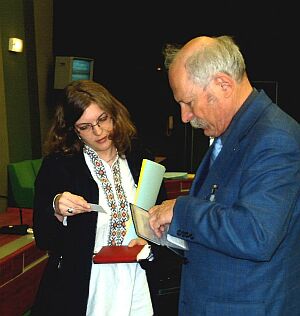
New Managing Director for Bellona Norway
The Board of the Bellona Foundation has appointed former Minister of Climate and the Environment Sveinung Rotevatn as Managing Director of Bellona No...
News

Publish date: September 5, 2003
Written by: Jon Gauslaa
News
The Committee on Legal Affairs and Human Rights of the Council of Europes Parliamentary Assembly, or PACE, adopted on September 1st a draft resolution on the case of environmental journalist Grigory Pasko, with 34 votes for and one against. The main factual foundation for this decision was a report prepared by PACEs special rapporteur, the German parliamentarian Rudolf Bindig.
Bindig, since being appointed as PACEs rapporteur in April 2002, has evaluated a considerable amount of the Pasko case documents, and also met representatives of Paskos defence, the prosecution and the Russian Supreme Court in Moscow. Judging by Bindigs report and the text of the now-adopted draft resolution, Russia still seems to have some way to go before it can take its place among the European nations ruled by law.
Russian Courts as Instruments of Intimidation
The committees resolution points out that Paskos case remains of general interest for all those who are intent on protecting the freedom of the press and freedom of expression in general. It stresses that the case of Pasko, as well as other cases, shows that the freedom of speech of Russian journalists and researchers is threatened by an obsessive spy-mania that is quickly spreading throughout Russia.
This state of affairs carries the risk of putting Russias courts in the disagreeable position of becoming instruments of intimidation against critical journalists, scientists and others.
The Committees Concerns
Even though the committee welcomes Paskos release from prison on parole in early 2003, it is still profoundly concerned with the unusual features characterising the prosecution, trial and conviction of Pasko through the different instances of the Russian military courts.
The committee emphasises, in particular, the legally flawed search procedure that was conducted in Paskos apartment during the pre-trial investigation; the fact that the conviction relied heavily on the now-defunct secret decree No. 055:96; the unusual divergences between the indictments and convictions, and a number of other fair trial issues.
The committee also points out that todays Russian legislation on state secrets gives the security services wide latitude in prosecuting treason cases, thus providing a formidable instrument of intimidation against courageous journalists such as Pasko. The committees members invited their colleagues in the Russian parliament, the State Duma, to start work on legislation that would ensure that secret decrees never again become the basis for criminal convictions.
Pasko Case Shows the Systems Grave Weaknesses
The committee also asserts that the Pasko case has exposed grave weaknesses and the need for greater transparency in the procedure before military tribunals, particularly in treason cases, where the secret nature of information, as determined by military experts, is of crucial importance.
It calls on the governments of those countries that still have military courts to ensure that the procedural safeguards guaranteed by Articles 6 and 7 of the European Convention on Human Rights are fully applied within the military courts system as well as they should be in civilian trials.
The resolution has been forwarded to PACEs Standing Committee, where its final adoption will take place on November 25 in Maastricht. The full text of the resolution is avvailable on PACEs website.

The Board of the Bellona Foundation has appointed former Minister of Climate and the Environment Sveinung Rotevatn as Managing Director of Bellona No...

Økokrim, Norway’s authority for investigating and prosecuting economic and environmental crime, has imposed a record fine on Equinor following a comp...

Our op-ed originally appeared in The Moscow Times. For more than three decades, Russia has been burdened with the remains of the Soviet ...

The United Nation’s COP30 global climate negotiations in Belém, Brazil ended this weekend with a watered-down resolution that failed to halt deforest...